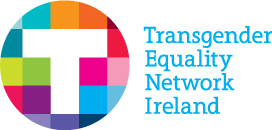Information
On July 15th 2015, the Irish Government passed the Gender Recognition Act. Gender recognition legislation provides a process enabling trans people to achieve full legal recognition of their preferred gender and allows for the acquisition of a new birth certificate that reflects this change.
The Gender Recognition Act allows all individuals over the age of 18 to self-declare their own gender identity. Young people aged 16-17 can also apply to be legally recognised, though the process is more onerous. A copy of the Act can be found here.
The application process is now open and available on the Department of Social Protection website here.
TENI will continue to advocate for the meaningful inclusion of young, intersex and non-binary people in the Gender Recognition Act.
Background
Legislative Developments
In May 2010, the Irish Government set up the Gender Recognition Advisory Group (GRAG), an inter-departmental working group. After consultation and research, the GRAG published a report in 2011 which outlined a legal pathway and qualification criteria for legal gender recognition which were highly restrictive and clearly infringed on an individual’s right to privacy, personal dignity and family life.
After significant delays in the introduction of legislation, two Private Members’ bills were introduced. Deputy Aengus O’Snodaigh launched his Gender Recognition Bill 2013 n 23 May 2013. It was modelled on the Argentinian legislation and was based on self-declaration. Senator Katherine Zappone launched the Legal Recognition of Gender Bill 2013 on 27 June 2013. TENI worked with Senator Zappone on the drafting of this legislation. Based on statutory declaration, this Bill would make the rights contained with legal recognition available to all trans and intersex people, irrespective of their marital or civil partnership status.
In July 2013, the Minister for Social Protection published the Draft Heads of Bill framework of legislation). This was subsequently referred to the Joint Oireachtas Committee on Education and Social Protection, made up of members of Dáil and Seanad for review. In September 2013, the Committee took written submissions from groups and individuals addressing the various Heads (sections). This was followed by two-days of public hearings in October. This process resulted in a comprehensive report by the Committee on Education and Social Protection which was published in January 2014 The Committee’s report was positive in many ways and addressed the shortcomings of the proposed legislation. Following the publication, the report was publicly debated in Dáil Eireann in May 2014 by TDs and the Minister for Social Protection. At the debate, four TDs from the majority of the main political parties (Labour, Fianna Fail, Sinn Fein) and one independent TD spoke positively about the legislation and encouraged the Minister to address the gaps and restrictive measures that remain in the proposed legislation.
In June 2014, the Minister for Social Protection published the revised General Scheme of the Gender Recognition Bill following Cabinet approval. The revised scheme included several significant changes to the proposed Bill, including the removal of a sports clause (which would have severely hindered trans people’s participation in sports) and provided a pathway for legal recognition for 16 and 17 years olds. The Minister also clarified and re-iterated that the legislation would include intersex affected individuals and that the medical criteria would not include a diagnosis. In the formal press release, the Minister noted: “The process will not require details of care including medical history or confirmation of a diagnosis. Nor will it require that the person has lived in the acquired gender for a specific period of time after their transition.” The General Scheme of the Bill was then referred to the Office of the Parliamentary Counsel for drafting and the Gender Recognition Bill 2014 was published in December 2014.
Seanad Debate
Dáil Debate
On 5th March the Gender Recognition Bill was debated in the Dáil. This was a historic moment as 26 TDs from all parties spoke on the Bill. All TDs broadly welcomed the introduction of the legislation but called on the Government to improve the Bill.
TDs from constituencies across Ireland spoke to the Bill, including members of Independents (9), Fine Gael (8), Labour (4), Sinn Féin (4) and Fianna Fáil (1). TDs were unified in addressing shortcomings of the Bill: Requirement that a primary treating medical practitioner affirm an applicant’s identity, need for applicants to be single (‘forced divorce’), absence of protection for, and acknowledgement of, young trans and intersex people.
After the debate, and under significant pressure, Minister Humphreys agreed to consult with GPs on their inclusion under ‘medical practitioners’. On 3rd June, it was announced that trans people over the age of 18 would be able to self-declare their gender identity and there would be no requirement of certification from a medical practitioner. The Bill was revised in the Select-Sub Committee meeting on 17th June and all medical criteria for individuals over 18 was removed.
Passage of Law
On 15th July 2015 the Gender Recognition Bill completed its passage through the Oireachtas and was sent to the President for signature. The Act was commenced in September 2015. The Department of Social Protection stated that 198 people had been legally recognised from 4th September 2015 – 31 December 2016. Of these 8 individuals were 16 or 17 years old.
International Pressure
Beyond Irish borders, the Government faced pressure from Europe on this issue. In 2012, following a trip to Ireland, the Council of Europe Commissioner for Human Rights, Nils Muižnieks, wrote to Minister Burton to highlight the lack of legal recognition of trans people. He expressed concern that no clear timeline was provided and stressed the importance of self-determination and the right to family life within the legislative framework.
In July 2014, the UN Human Rights Committee issued their concluding observations after their examination of Ireland’s compliance with the International Covenant on Civil and Political Rights (ICCPR). In their concluding statements, the Committee explicitly raised issues with the new Heads of a Gender Recognition Bill with specific reference to the single requirement which would force married trans people to get divorced in order to have their gender legally recognised.
Dr Lydia Foy
In March 1993, Lydia Foy wrote to the Irish Registrar General seeking a new birth certificate showing her female gender. Her request was refused. A High Court ruling in 2007 found the State to be in breach of its positive obligations under Article 8 of the European Convention on Human Rights (ECHR) in failing to recognise Dr. Lydia Foy in her female gender and provide her with a new birth certificate. This was the first declaration of incompatibility to be made under the ECHR Act. In January 2013 Dr Foy began her third set of legal proceedings against the Irish State as part of that struggle for recognition. In November 2014, Lydia Foy settled her case and the Irish Government complied by publishing the Gender Recogntion Bill on 19th December.

